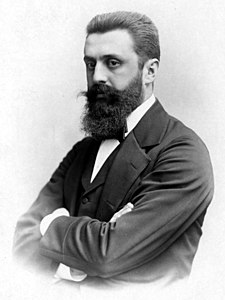Binyamin Ze'ev Herzl
| Theodor Herzl | |
|---|---|

Theodor Herzl
|
|
| Born |
Benjamin Ze'ev Herzl May 2, 1860 Pest, Kingdom of Hungary, Austrian Empire |
| Died | July 3, 1904 (aged 44) Reichenau an der Rax, Archduchy of Austria below the Enns, Austria-Hungary |
| Resting place | 1904–1949: Döblinger Friedhof, Vienna, Austria 1949–present: Mt. Herzl, Jerusalem 31°46′26″N 35°10′50″E / 31.77389°N 35.18056°E |
| Residence | Vienna |
| Citizenship | Austria-Hungary |
| Education | Law |
| Alma mater | University of Vienna |
| Occupation | Journalist, playwright, writer, political activist |
| Known for | Father of modern political Zionism |
| Spouse(s) | Julie Naschauer (m. 1889–1904) |
| Signature | |
Theodor Herzl (Hebrew: תאודור הֶרְצֵל Te'odor Hertsel, Hungarian: Herzl Tivadar; May 2, 1860 – July 3, 1904), born Benjamin Ze'ev Herzl (Hebrew: בִּנְיָמִין זְאֵב הֶרְצֵל Binyamin Ze'ev Hertsel), also known in Hebrew as חוֹזֵה הַמְדִינָה, Chozeh HaMedinah (lit. "Visionary of the State") was an Austro-Hungarian journalist, playwright, political activist, and writer who was one of the fathers of modern political Zionism. Herzl formed the World Zionist Organization and promoted Jewish migration to Palestine in an effort to form a Jewish state. Though he died long before its establishment, he is generally considered a father of the State of Israel, formed in 1948.
While Herzl is often referred to as the first major Zionist activist, scholars such as Yehuda Bibas, Zvi Hirsch Kalischer and Judah Alkalai were promoting Zionist ideas before him.
Herzl is specifically mentioned in the Israeli Declaration of Independence.
Theodor Herzl was born in Tabak Gasse, a street in the Jewish quarter of Pest (now eastern part of Budapest), Kingdom of Hungary (now Hungary), to a secular Jewish family. His father's family were originally from Zimony (today Zemun, Serbia). He was the second child of Jeanette and Jakob Herzl, who were German-speaking, assimilated Jews.
...
Wikipedia
